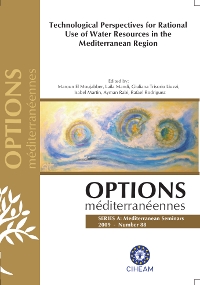| Article précédent | p. 209-219 | Article suivant |
Mainstreaming agricultural and water policies for social equity and economic efficiency
The world population, especially those living in developing countries, is facing two major challenges represented by increasing water scarcity and looming food crises. In order to solve food shortage and secure a high degree of self-sufficiency, many of these countries have considerably expanded irrigated agriculture and this has resulted in over-exploitation and deterioration of water resources. In spite of all investments, the contribution of the agriculture sector to the national economy is declining while food imports are on the increase. In order to solve these problems an integrated approach has to be adopted by mainstreaming water and agricultural policies aimed at social equity and economic efficiency. These policies should also take into account resources conservation and environmental sustainability without compromising the rights of the future generations. Achieving food security with limited water resources is an approach that appears too ambitious but applicable where political will may rely upon strategic planning and scientific support. During the last two decades, scientific and technological advances made it possible to solve many problems in the field of agricultural development. High-tech applications in agriculture e.g. high-tech irrigation systems, soil-less culture, high-yielding varieties, and biotechnology have allowed to increase production by five to ten times. These technologies are becoming feasible with increasing food price and limited water supply. Under these conditions water productivity will be significantly enhanced compared to traditional or protected agriculture.
Pour relever les défis liés à la rareté de l'eau et aux crises alimentaires, les pays en développement ont considérablement développé l'agriculture irriguée jusqu'à la surexploitation et la détérioration des ressources en eau. Malgré ces investissements, la part de l'agriculture ne cesse de décroitre et les importations alimentaires d'augmenter. Pour résoudre ce problème, une politique intégrée de l'eau et de l'agriculture doit être adoptée visant l'équité sociale et l'efficience économique et prenant en compte la conservation des ressources et la durabilité de l'environnement. Même si atteindre la sécurité alimentaire quand les ressources en eau sont limitées, semble une approche trop ambitieuse, elle paraît néanmoins réalisable à condition que la volonté politique soit soutenue par une planification stratégique et un appui scientifique. Ces deux dernières décennies, les progrès scientifiques ont permis de résoudre de nombreux problèmes dans le domaine du développement agricole. Les applications de haute technologie en agriculture, comme les systèmes d'irrigation très avancés, la culture hors-sol, les variétés à haut rendement et les biotechnologies ont permis de multiplier la production de 5 à 10 fois. Ces technologies seront de plus en plus appliquées étant donné la hausse du prix des aliments et la limitation des ressources en eau. Elles permettront d'augmenter considérablement la productivité de l'eau par rapport aux systèmes de culture traditionnels ou protégés.
- [ Afficher ]
- [ Télécharger ]
- [ Exporter la citation ]
Vous pouvez télécharger la citation au format :
- [ Imprimer ]
-
Mots-clés
EAU DISPONIBLE, EAU SALINE, EAU USEE, EFFICIENCE D'UTILISATION DE L'EAU, GESTION DES EAUX, METHODE D'IRRIGATIONCiter cet article
Shatanawi M., Naber S., Shammout M. Mainstreaming agricultural and water policies for social equity and economic efficiency. In : El Moujabber M. (ed.), Mandi L. (ed.), Trisorio-Liuzzi G. (ed.), Martín I. (ed.), Rabi A. (ed.), Rodríguez R. (ed.). Technological perspectives for rational use of water resources in the Mediterranean region. Bari : CIHEAM, 2009. p. 209-219. (Options Méditerranéennes : Série A. Séminaires Méditerranéens; n. 88). 2. MELIA Workshop Technological Perspectives for Rational Use of Water Resources in the Mediterranean Region, 2008/10/29-2008/11/02, Marrakesh (Morocco). http://om.ciheam.org/om/pdf/a88/00801196.pdf



